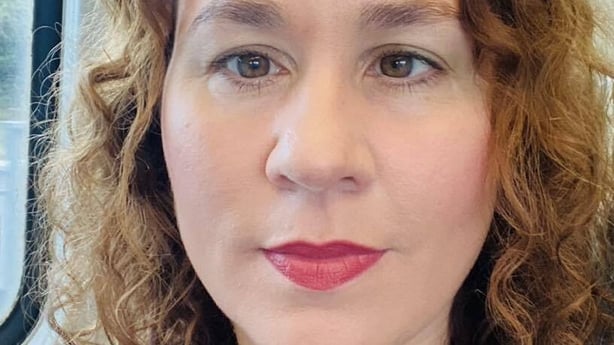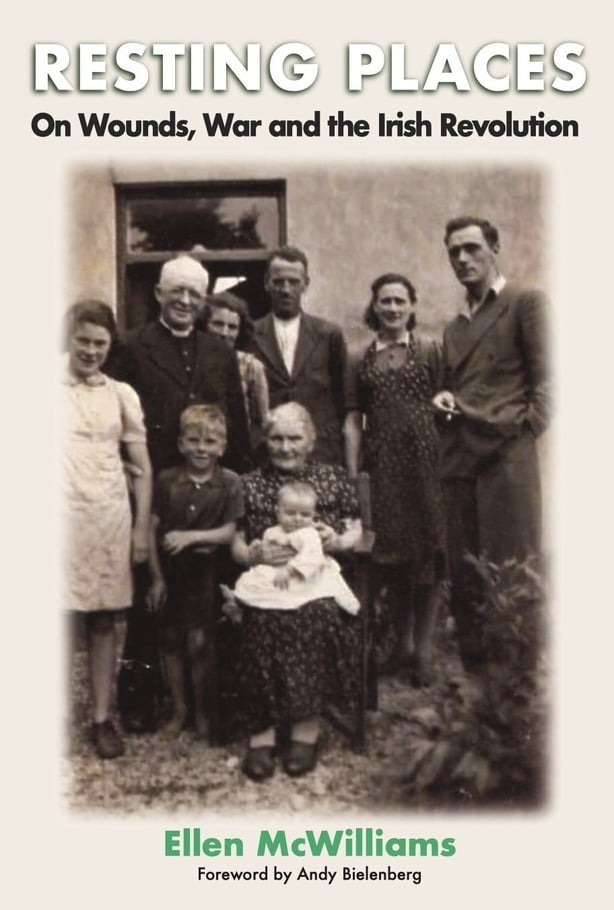We present an extract from Resting Places, the new book by academic and author Ellen McWilliams.
Subtitled 'On Wounds, War and the Irish Revolution' in Resting Places Ellen McWilliams reflects on her Catholic upbringing in West Cork in the 1980s and 1990s, and on relations with her Protestant neighbours. She is haunted by the killings in the period of Ireland's War of Independence and Civil War, and in particular by the ‘Dunmanway massacre’ of April 1922 which marked the area where she grew up - the book reveals why the events of those days remain deeply personal and how they shaped her adult life. It's a book about darkness, sight and illumination, delayed speech, and what happens when concealed histories are brought into the light.
Stations of the Cross: Grief-Stricken Shadow
The poet Derek Mahon is right to warn that sometimes home is the most terrifying place of all. The unearthing of some histories is like a slow-landing grief and it was on Easter Sunday of all Sundays that I found the source – the source that named the Protestant families in West Cork who were hurt in the tumultuous final throes of the Irish War of Independence in 1921.
And it was on Easter Sunday I read the full story of the atrocity that took place in the townlands around Bandon, Ballineen and Enniskeane, Dunmanway and Clonakilty in 1922 that saw thirteen men murdered and disappeared. April can indeed be the wickedest and cruellest of months. The family names land like bullets on the page and my right eyelid starts to pulse and flicker.
If a heart breaks slowly enough does it make any sound at all?
In the days and weeks that followed I returned time and again to the same pages, willing that the history might be undone, the alphabet unwritten, letters rearranged to untell the terrible truth. 'Tell the truth and shame the devil' is a saying my mother taught me early when neither of us knew its provenance.
I shut my eyes because it is centuries too late and there can be no reparation, no apology or redress that is ever really enough. I am frightened by myself at such animal and irrational moments – when the ground itself seems to break beneath my feet – or perhaps these feelings are entirely rational? I am afraid that I no longer know the difference. There are times when I have been afraid I might have spoken out loud and am relieved when it turns out I have only whispered quietly to myself or talked in my troubled sleep. I put on my running shoes and resume my restless walks early in the morning and late in the evening, and keep up with the day in between, the routine of love and care that allows the centre to still hold – reading to my small son when he comes home from pre-school and tucks into my arms and we turn the pages together, dusting and hoovering and cleaning windows and mirrors, hanging my husband’s shirts on the line where they take pleasure in the summer drying. I pour milk into my son’s favourite dinosaur cup and kiss the top of his head as he sits painting a rainbow at the kitchen table and I hold my breath as I return the carton to the fridge and close the door and stop still for a moment to see if the haunting is still there. It is and perhaps it always will be.

The cathedral to travel that is Bristol Temple Meads is the work of Isambard Kingdom Brunel, which is a name made for great achievements if there ever was one. It is a short walk into town to Broadmead where you find the peace and light of John Wesley’s Methodist Chapel, his New Room in the horsefair, nestled in its cobblestone yard, a statue of the man on his horse poised and pointing determinedly for the road. We went to see it for the first time not long after our baby was born, but these days I visit the cobbled yard regularly, with its stone engravings from Wesley’s letters and sermons and gentle reminder that ‘an ounce of love is worth a pound of knowledge’. The Methodist population that was at home in West Cork in the early years of the 20th century was evangelical in spirit and committed to temperance and good works and Christian endeavour in the community. History has gifted us with an archive that tells the complete story of this community and some of the families found in the archive have historical roots in England’s West Country.
The separation of the Methodist and Catholic communities in the townlands around Bandon, Dunmanway, Ballineen and Enniskeane, and Clonakilty was such that there was an unspoken but absolute understanding that intermarriage was unthinkable – each to the other would be forbidden fruit – but the historians reassure us that this did not stop the two communities from being the best of friends and neighbours to each other.
I carry the questions in my pocket:
How do you atone for a massacre?
How do you forgive a massacre?
How long does it take to write about a massacre?
I have only one answer and no other answers. It takes a year – and it takes a hundred years. I get off the train at Temple Meads and stand still for a moment because, not for the first time, the rest of me is in Desertserges Church of Ireland Chapel on Christmas Eve. The now lost friend of my childhood turns and our eyes meet and we smile quietly at each other and for a moment she seems to glow in the candlelight. I had never before been inside the door of that church until that evening and the draw of friendship and welcome carried us in slowly.
I had prayed in the cemetery on many occasions when the two parts of the one place gathered together in the summertime under the green shade of tall trees to remember the bodies and souls buried there – because of the narrow coiling turns of history it happens to be the resting place of both Catholics and Protestants.
I have discovered that even if you are not usually quick to tears you can weep freely, untroubled and unseen at a train station because people are too busy with their own direction of travel – so long as you are still enough and your face does not give you away and if it is raining, you are luckier still because nobody will notice the tears as they fall. There was a time when I wondered if the tears would ever stop falling, a mourning for who we might have been if somehow everything had been different.

Resting Places is published by Beyond The Pale Books - find out more here.

